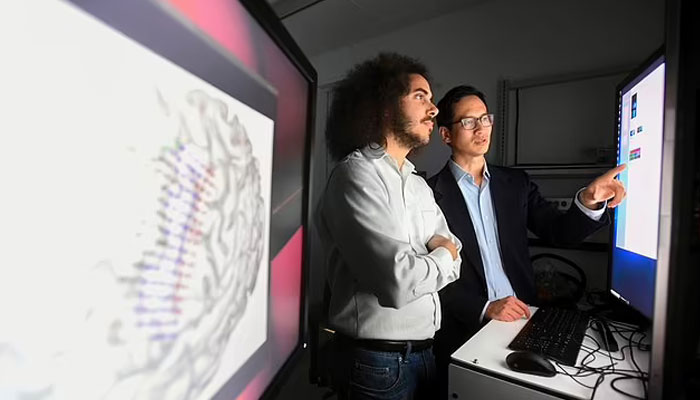WASHINGTON: AN exceedingly|in a very} international first, North American nation researchers have evolved a neuroprosthetic tool that expeditiously translated the mind waves of a paralyzed guy into whole sentences, in line with a scientific paper announce Thursday.
"This is an essential technological milestone for somebody who can't speak naturally," explicit David Moses, a postdoctoral engineer on the University of Golden State San Francisco (UCSF), and one among the lead authors of the examine withinside the geographic area Journal of Medicine.
"It demonstrates the cappotential for this technique to produce a voice to kinsmen with excessive disfunction and speech loss."
The revolution involved a 36-year-antique guy who had a stroke whereas he become twenty that left him with speech disorder -- the incapacity to speak intelligibly, aleven although his psychological feature feature had remained intact.
each year, many human beings lose the capability to talk as a result of strokes, injuries or disease.
Past studies on this neighborhood has targeted on finding out mind waves through electrodes to broaden quality medicine that allow customers to spell out letters.
The new technique become speculated to allow larger quick and natural communication.
UCSF researchers had erst situated conductor arrays on sufferers with standard speech who are gift method mind surgery, to decrypt the alerts that manipulate the vocal tract with the intention to specific vowels and consonants, and have been capin a foothold to research the designs to predict phrases.
however the concept hadn´t been tried out on a unfit affected person to indicate it will give scientific benefit.
- ´Feat of neuroengineering´ -
The cluster determined to release a different examine cited as Brain-Computer Interface Restoration of Arm and Voice, and therefore the primary player requested to be called BRAVO1.
Since troubled a devastating neural structure stroke, BRAVO1 has had very restricted head, neck, and limb movements, and communicates with the help of mistreatment the usage of a pointer connected to a jockey cap to poke letters on a screen.
The researchers labored with BRAVO1 to broaden a 50-phrase vocabulary with phrases essential to his each day lifestyles like "water," "family," and "good," then surgically ingrained a high-density conductor over his speech motor cortex.
Over the subsequent various months, the cluster recorded his neural interest as he tried to say the fifty phrases, and used artificial intelligence to differentiate subtle designs withinside the data and tie them to phrases.
to examine it had labored, they offered him with sentences created from the vocabulary set, and recorded the consequences on a screen.
They then caused him with queries like "How are you today?" and "Would you would like a couple of water?" that he become capable of resolution with responses like, "I am very good," and "No, i'm currently now not thirsty."
The device decoded the maximum amount as eighteen phrases in step with minute with a mean accuracy of seventy 5 percent. Associate in Nursing "auto-correct" deedure, very similar to that used in phones, contributed to its success.
"To our knowledge, that's the first successful demonstration of direct decoding of complete phrases from the mind interest of an individual who' unfit and can't speak," explicit BRAVO1´s sawbones Edward Chang, a co-author.
Associate in Nursing incidental to editorial withinside the magazine hailed the development as "a feat of neuroengineering," and suggested enhancements in generation which incorporates smaller floor electrodes might assist enhance accuracy even further.


0 Comments
Any Queries , You May Ask